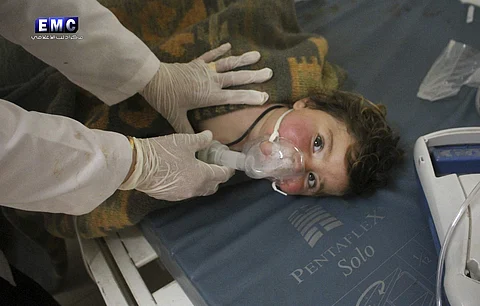

BEIRUT: A suspected chemical attack on a rebel-held town in Syria's Idlib province on April 4 killed scores of people.
Western powers hold President Bashar al-Assad's forces responsible and France said Wednesday that scientific proof exists to back up the charge.
Here is a recap of developments:
The suspected attack
On April 4, 2017, an air strike hits the rebel-held town of Khan Sheikhun, killing 88 people including 31 children.
The Britain-based Syrian Observatory for Human Rights labels the raid the second deadliest use of chemical weapons in Syria's six-year conflict. A sarin gas attack on a Damascus suburb in 2013 killed hundreds of people.
Doctors in Idlib province note symptoms indicating likely exposure to toxic gas, including pinpoint pupils, convulsions and foaming at the mouth.
The accusations
Syria's opposition accuses Assad's regime of using munitions containing "toxic gas". The army categorically denies the charge.
A wave of international condemnation follows, with several governments accusing Assad of responsibility. The United States condemns the act as "reprehensible".
On April 5, Russia comes to Assad's defence, saying Syrian jets had hit a "terrorist warehouse" near Khan Sheikhun that contained "toxic substances".
British Foreign Secretary Boris Johnson says "all the evidence" points to Assad's forces "using illegal weapons on their own people".
The World Health Organization says victims showed symptoms consistent with the use of a nerve agent, while humanitarian group Doctors Without Borders (MSF) speaks of sarin gas.
Turkish President Recep Tayyip Erdogan says Assad is a "murderer".
Trump's threat
On April 6, US President Donald Trump threatens Syria, calling the attack "egregious" and an "affront to humanity".
US Secretary of State Rex Tillerson warns that Washington is "considering an appropriate response," and US ambassador to the UN Nikki Haley hints at unilateral action.
Moscow says Washington does not have "realistic, verified information" to back up its allegations. President Vladimir Putin says that accusing Assad without proof is "unacceptable".
Syrian Foreign Minister Walid Muallem insists the army "has not, did not and will not use this kind of weapons" even against "the terrorists that attack our civilians".
US missile barrage
Overnight on April 6-7, the US military fires 59 Tomahawk missiles from warships in the eastern Mediterranean at the central Shayrat airbase, which it says was the launchpad for the alleged chemical attack.
The Syrian government describes the US strike as "foolish and irresponsible". Moscow calls the attack an "aggression against a sovereign state in violation of international norms".
On April 10, a US military spokesman says the Pentagon believes the Syrian regime probably has additional chemical weapons stocked at the targeted airfield.
The following day, Pentagon chief Jim Mattis says Washington has "no doubt" that Assad's regime was behind the chemical attack.
'Irrefutable' use of sarin gas
On April 12, Britain's ambassador to the UN says that scientists who have analysed samples from the site of the explosion have concluded that sarin or a similar neurotoxic agent was used.
Russia vetoes a proposed Security Council resolution demanding the Syrian government cooperate with an international investigation.
On April 13, Assad tells AFP in an interview that western powers "fabricated" the attack to justify the US air strike.
The Organisation for the Prohibition of Chemical Weapons says almost a week later that "incontrovertible" test results showed sarin gas or a similar substance had been used.
'No doubt'
On April 26, French Foreign Minister Jean-Marc Ayrault cites intelligence services and says: "There is no doubt about the responsibility of the Syrian regime given the way that the sarin used was produced."